Present Perfect Tenses Definition and 20 Example Sentences Lessons For English

List Of Contoh Present Perfect Tense Positive Negative Interrogative References ⬆️ Klik Untuk
Jika kamu sudah mengenal ciri-ciri kalimat positive negative interrogative, silahkan lanjut ke subpoin berikutnya untuk membaca puluhan contoh kalimat Present Perfect Tense. Kalimat Positif , dalam bahasa Inggris disebut juga Affirmative Sentences adalah pernyataan atau informasi yang menyatakan sesuatu secara positif.

PRESENT PERFECT TENSE This post includes detailed expressions about Present Perfect Tense and
The Present Perfect Tense is formed by using the auxiliary verbs "have" or "has" and the past participle of the verb. For example, the past participle of the verb "to eat" is "eaten," so the Present Perfect Tense of "to eat" would be "I have eaten," "you have eaten," "he/she/it has eaten," "we have eaten.

Present Perfect Tense Definition, Examples, & Rules»
The present perfect (simple) connects the past with the present. We use present perfect questions to ask about recent events that are news.. negative sentences with still and yet b1. wh- questions a2. Past perfect continuous. affirmative, negative, yes/no, wh- questions b2.
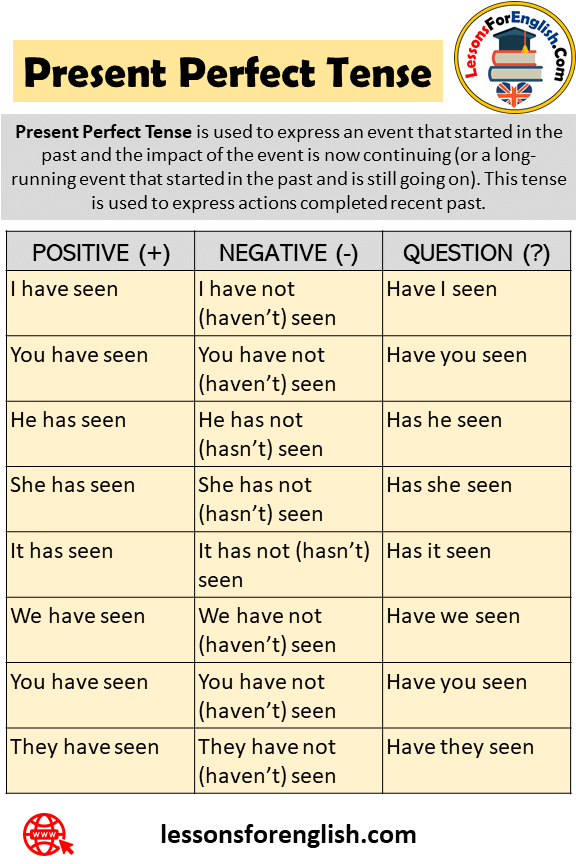
Present Perfect Tenses Definition and 20 Example Sentences Lessons For English
All Forms 1. Make the present perfect tense - positive, negative or question. Click here to review how to make the present perfect. Click here to return to the list of English grammar exercises. Download this exercise in PDF.

This Worksheet Has Exercises On Present Perfect Tense Positive Negative Interrogative Forms
The general formula of the present perfect tense is as described below: Subject + have/has + past participle + the rest of the sentence. The structure of the present perfect tense can be analysed with reference to positive, negative, interrogative and negative interrogative types of sentences. Have a look at the table given below for a closer.
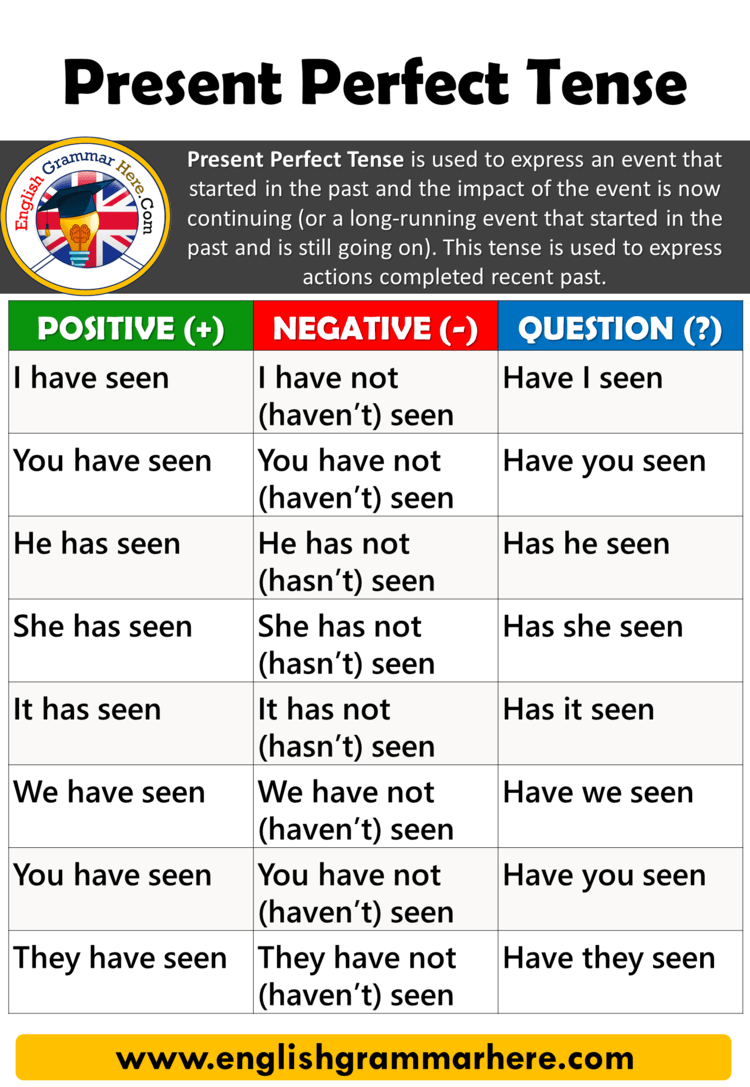
Using The Present Perfect Tense in English English Grammar Here
Grammar Rules of the Present Perfect Tense. Affirmative Sentences: To make a positive sentence with the Present Perfect Tense, you should use the subject, the auxiliary verb have or has, the third form of your verb, and the object. The point you need to pay attention to here is that the subjects I, You, We, and They should take the auxiliary verb have.
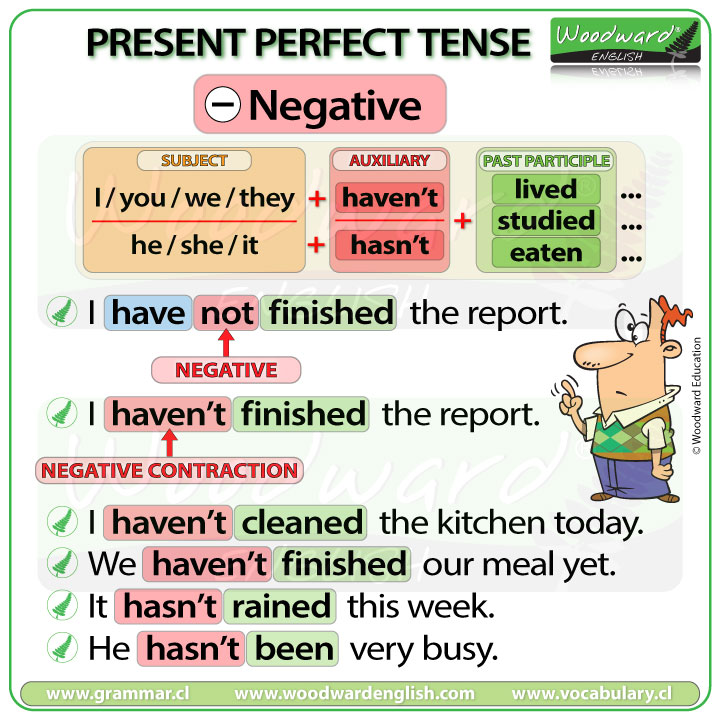
Let's Learn Present Perfect Tense Yuditra Farmana
Verb Tenses in English Grammar (Definition, Formula & Examples) Present Perfect Tense Sentences. These are 50 sentences (affirmative, negative, and interrogative) of past perfect tense for your practice.. Affirmative Sentences. I have been to Singapore.; I have been to England three times.; Alice has studied two foreign languages.; You have grown taller since the last time I saw you.
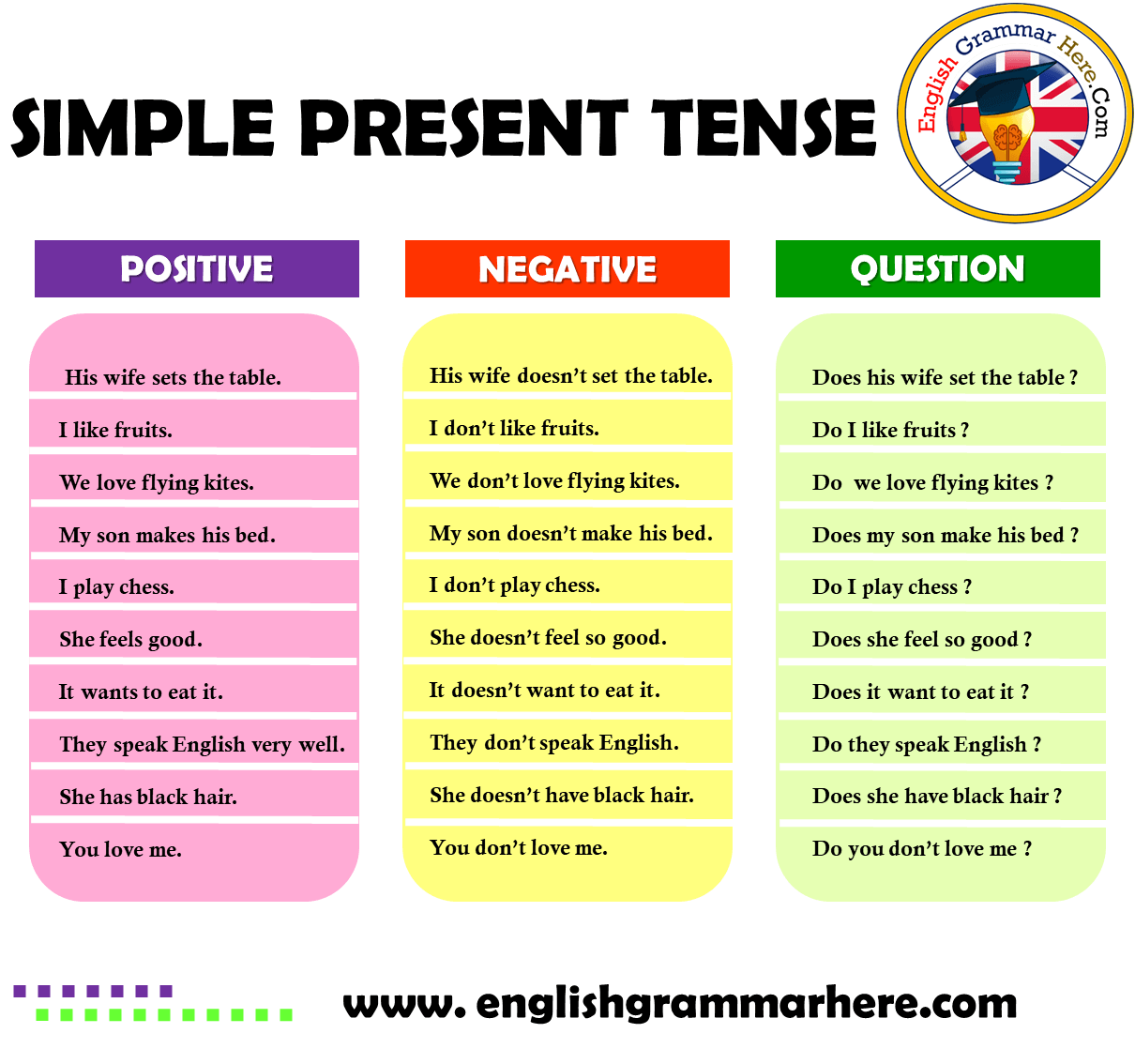
Simple Present Tense Positive, Negative, Question Examples English Grammar Here
1 Yes / no questions. As you can guess, yes / no interrogative sentences are questions where the answer is either yes or no. The rest of the information, such as the subject and action, is known, but the speaker is requesting either an affirmative or negative response. Yes / no questions always start with either the verb be or an auxiliary verb.

List Of Contoh Present Perfect Tense Positive Negative Interrogative References ⬆️ Klik Untuk
⬤Formation of present perfect tense. To make positive (affirmative) sentences we use the formation of "have/has" + Past participle verb".For negative sentences we use "not" after the auxiliary verbs "have" and "has".The short forms are "hasn't" and "haven't".You can use "'s" and "'ve" as short form of "has" and "have".

All Tenses in English, Positive Sentences, Negative Sentences and Question Sentences English
The present perfect tense describes an action that began in the past and the action being described is still continuing into the present. For example: We have eaten the burger here. The first element is have or has, depending on the subject the verb is conjugated with. We often use the Present Perfect to talk about experience from the past.
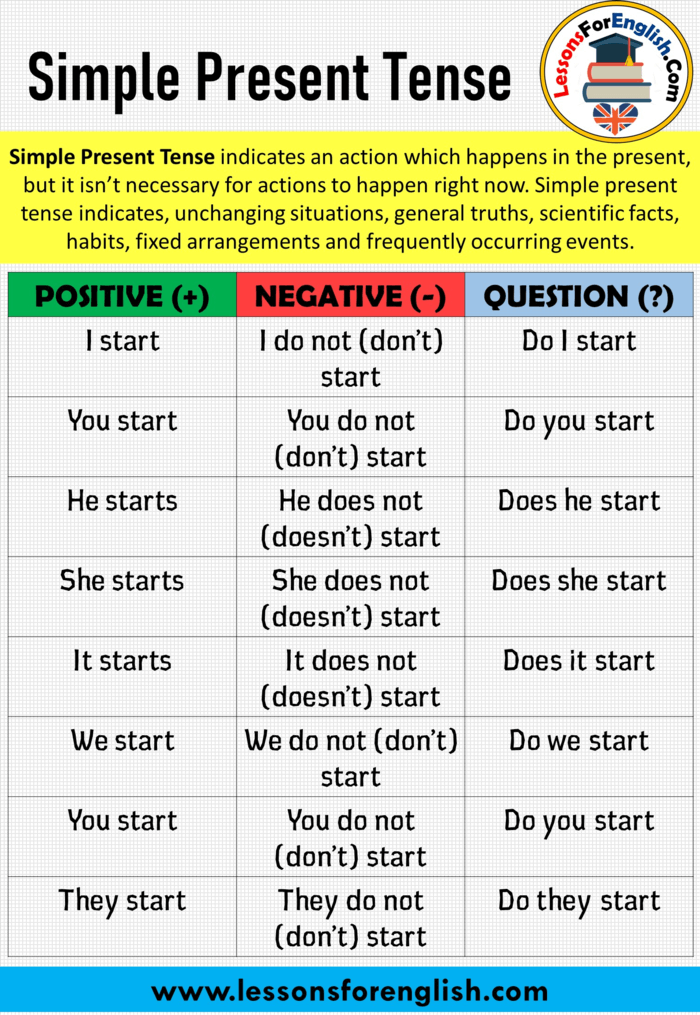
Simple Present Tense, Positive, Negative and Question Sentences Lessons For English
Present Perfect Tense Positive, Negative, Interrogative Sentences. Hi friends and my dear students! In Spoken English Lesson - 7 I would like to share the topic of Present Perfect Tense Positive, Negative, Interrogative, Negative Interrogative Sentences. After reading this lesson, please practice in your daily life. We shall meet tomorrow in the next lesson.
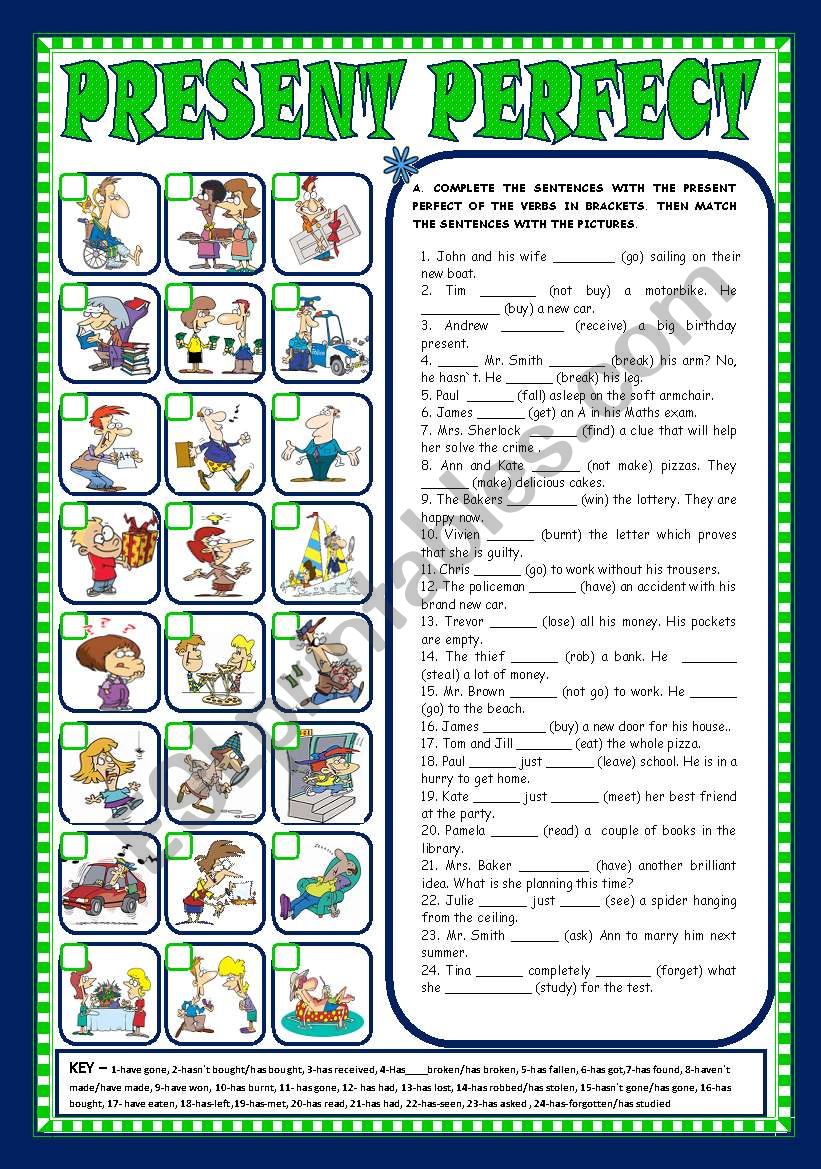
PRESENT PERFECT AFFIRMATIVE, NEGATIVE and INTERROGATIVE FORMS (+KEY) FULLY EDITABLE ESL
Past and present perfect simple 1; Past and present perfect simple 2; Present perfect - worksheets; Past simple vs present perfect; Present perfect - negative; Present perfect - questions; Present perfect tense / answers; Present perfect worksheet-> answers; Past and present perfect tense Worksheet test -> answers; Present perfect - pdf handouts
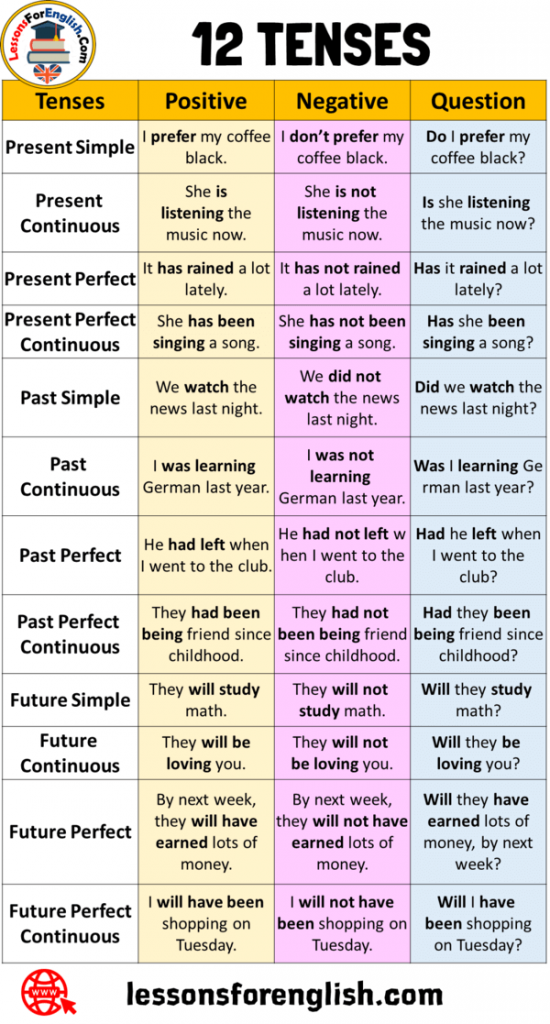
12 TENSES, Negative Positive Question Sentences Examples Lessons For English
The present perfect in its negative form denies completed actions that have occurred in the past, are connected to the present and still have effects on it. You can confirm something with Affirmative form and ask something with Interrogative form.. In English, for better understanding of how to use the form of verb in present perfect, you can learn past participle.

Present Perfect Simple forms Positive, Negative, Interrogative/Question, Interrogative in
In the following exercises we will go through the positive, negative and interrogative forms of the Present Perfect Tense with the help of structure/formula and simple examples. a) Positive Sentences. Structure/Formula: Positive sentences in the Present Perfect tense can be expressed in two forms-( subject + auxiliary verb + main verb + object)

This worksheet has EXERCISES on PRESENT PERFECT TENSE POSITIVE, NEGATIVE & INTERROGATIVE FORMS
The present perfect tense is used to describe: an action or situation that began sometime in the past and continues into the present time. an action performed during a period that has not yet completed. a repeated activity in an unspecified time period between the past and the current time period. an action that finished in the very recent past.

Present Perfect Tense Rules & Example GrammarVocab
Students > Solutions > Elementary > Grammar > Unit 10 - Exercise 2 - Present perfect: negative and interrogative. Grammar; Everyday English Unit 10 - Exercise 2 - Present perfect: negative and interrogative.